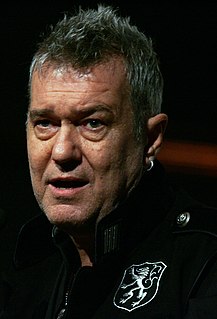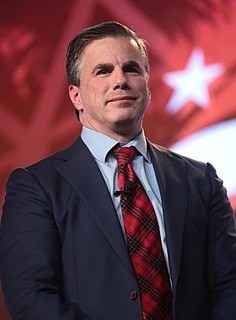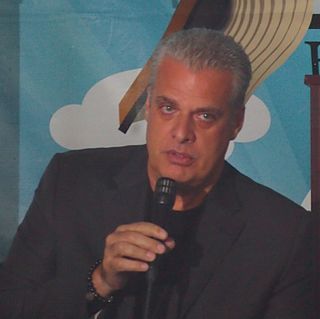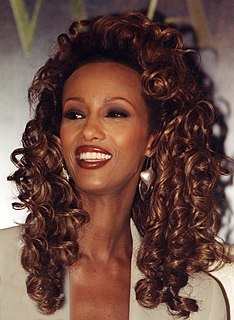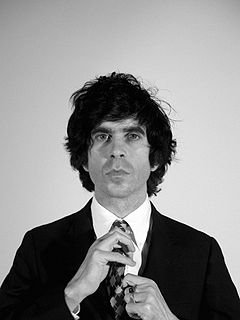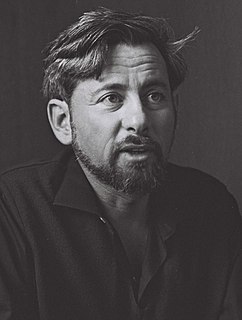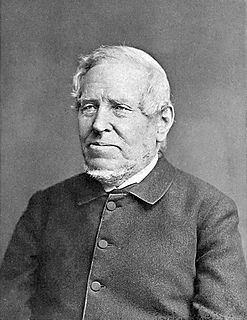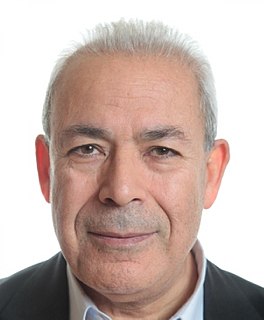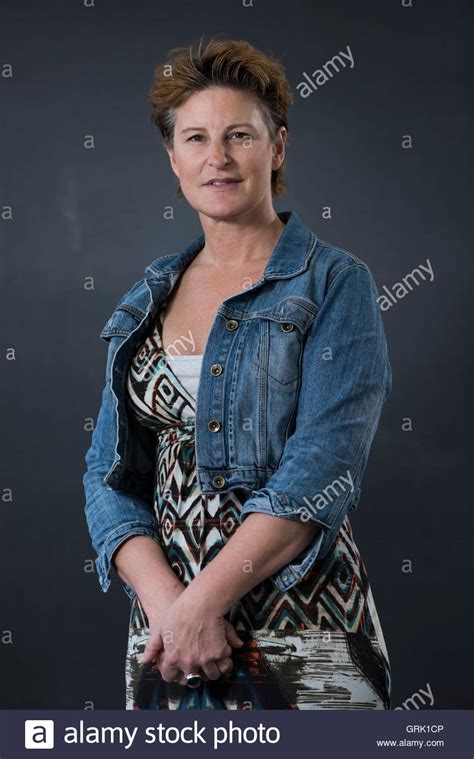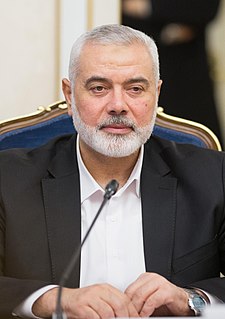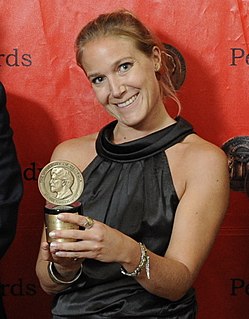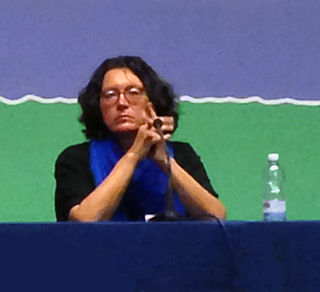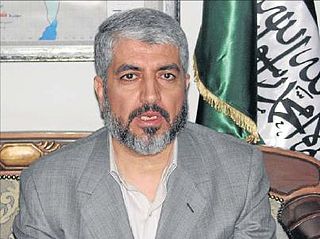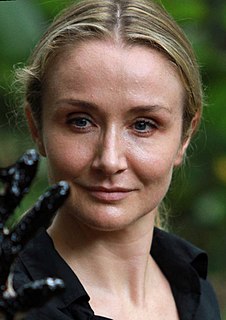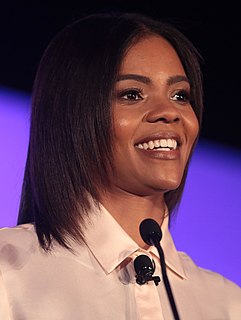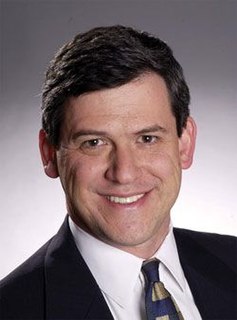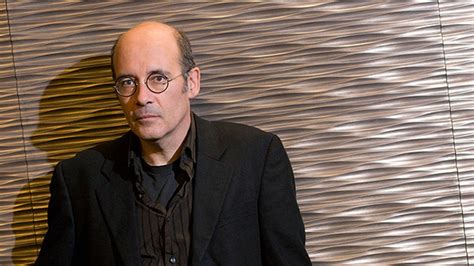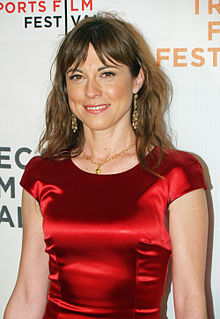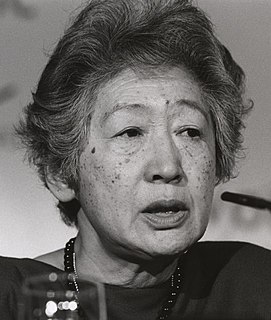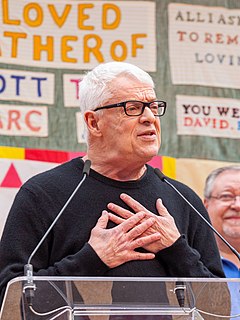Top 690 Syrian Refugees Quotes & Sayings - Page 11
Explore popular Syrian Refugees quotes.
Last updated on December 19, 2024.
In the 1970s, we got a Labor government that put more emphasis on trade with Asia; the Vietnam war ended, and refugees were coming in. We were more part of Asia than America and the rest of the world. There was the proximity, for a start - all these countries and cultures just north of us. It just made sense that that's what we were part of.
For years, Lebanese have known that Palestinian camps like Nahr al-Barid and Ain al-Helwe - hopeless slums crowded with generations of disenfranchised Palestinian refugees who can't go home because of Israel, and can't work because of Lebanese laws - are awash with gunmen, criminals and, since the war in Iraq, al-Qaida inspired jihadists.
The world beyond 450 ppm atmospheric concentrations of carbon dioxide, the world that crosses carbon cycle tipping points that quickly take us to 1000 ppm, is a world not merely of endless regional resource wars around the globe. It is a world with dozens of Darfurs. It is a world of a hundred Katrinas, of countless environmental refugees
If the American people had known the truth - that Barack Obama, Hillary Clinton and other top administration officials knew that the Benghazi attack was an al-Qaida terrorist attack from the get-go - and yet lied and covered this fact up - Mitt Romney might very well be president. These documents also point to connection between the collapse in Libya and the ISIS war - and confirm that the U.S. knew remarkable details about the transfer of arms from Benghazi to Syrian jihadists.
You look at Libya, and you go, "Jesus, why the hell did we do that?" That's beyond stupid. That's so irresponsible and dangerous for our national security and frankly for the national security of Europe because you go and you look at where a lot of these refugees are coming out of, they're coming out of Misrata and Tripoli.
Bad acting comes in many bags, various odors. It can be performed by cardboard refugees from an Ed Wood movie, reciting their dialogue off an eye chart, or by hopped-up pros looking to punch a hole through the fourth wall from pure ballistic force of personality, like Joe Pesci in a bad mood. I can respect bad acting that owns its own style.
The Last Arrow transcends a moment or an issue. It is a call to move beyond self-indulgence to a life of sacrificial service. In The Last Arrow I address a broad spectrum of issues from the Syrian refugee crisis to the cultural epidemic of depression to the personal struggle of insignificance. The Last Arrow is a clarion call to make a difference in the world rather than a self-help book for personal self-improvement.
ISIS is a formidable foe, but the counter forces to it have only just begun and if these forces, the Iraqi army, the Kurdish Peshmerga, American air power, the Syrian Free Army, work in a coordinated fashion, it will start losing ground. Also, please keep in mind that ISIS does not actually hold as much ground as the many maps flashed on television keep showing. Large parts of those territories that ISIS supposedly controls are vacant desert.
Can we disregard the growing phenomenon of "environmental refugees", people who are forced by the degradation of their natural habitat to forsake it - and often their possessions as well - in order to face the dangers and uncertainties of forced displacement? Can we remain impassive in the face of actual and potential conflicts involving access to natural resources? All these are issues with a profound impact on the exercise of human rights, such as the right to life, food, health and development.
I came from a background where I was very poor growing up but I have never known poverty. My parents worked hard and they went to bed hungry, but they fed us. Then my father became an ambassador, so I ended up being driven by chauffeurs. And then we became refugees. After that, I looked at it through this "glass" of to have and have not, and at the end of the day, who actually helps, who actually steps up, who is there for you.
For me, respect is an extremely important political term. Since I began campaigning, it has been at the heart of each of my speeches. Many people have the feeling that politicians aren't paying a sufficient amount of attention to them. And then, when the refugees arrived on top of all problems, there was a feeling: You do everything for them, but nothing for us. This mixture of frustration and fear has led to this reaction. That is why it is so important to show these people: We respect you.
What has happened in the last generation is that Tijuana has become a new Third World capital - much to the chagrin of Mexico City, which is more and more aware of how little it controls Tijuana politically and culturally. In addition to whorehouses and discos, Tijuana now has Korean factories and Japanese industrialists and Central American refugees, and a new Mexican bourgeoisie that takes its lessons from cable television.
US opposition to Russia and China has entailed sanctions against Russia, and Russia in turn has made counter-sanctions against Europe. So Europe is essentially sacrificing its opportunities for trade and investment in order to remain part of NATO. It is also agreeing to bomb Syria and the Near East, creating a wave of refugees that it doesn't know what to do with.
Why are all these refugees rushing to the beauty and strength of Europe and to the United States and not rushing to their own capitals or the capitals of the Muslim world? We ought to be pushing back. We ought to be putting people back on these boats and putting them back into the places where they came from and telling these leaders in the Arab world, "You have a responsibility as well."
In the south of India, they educated girls. Three things came together in southern India that are unbelievably coincidental. There, the local Maharajas believed in education for everybody. The Syrian Catholic Church built schools for boys and girls. And then the Communist party, which took over politics for a period of time, had very strong social policies that benefited women. As a result, girls got into school. It was the first part of the country where towns could claim to be 100 percent literate. And so there, you're going to have a sex ratio at birth that's normal.
If resources become scarce, people tend to fight for them. This is increasing the number of people on the move and the number of people forced to move. They're not refugees, according to the legal definition, but they represent a major humanitarian and human rights challenge, as well as a major challenge for world politics.
Yahweh demanded justice for the poor, compassion and equality for foreigners and refugees, systemic redress for poverty, structural mechanisms to protect the homeless and family-less from abuse and destitution, fair and equitable distribution of land, integrity in the judicial system, humility, simplicity and morality in the government (as opposed to wealth, women and weapons), etc. etc. If you want that kind of society, you need to be faithful to the living God.
Angela Merkel embodies Germany's 20th century fate. It is not up to me to pass judgment on her place in history, but I believe that she is the chancellor of Germany's reconciliation with Europe. She stands for a Germany for whom globalization has been a success and which accepts its role in foreign and defense policy. I thought the way she dealt with the refugees was courageous. I think she is the chancellor of reconciliation.
Of the 2,000,000 Armenians in Turkey in 1914, one million have been slaughtered, and the survivors only 130,000 remain in Turkey and the rest are refugees and exiles. Armenian property losses are valued at over 5,000,000,000 dollars are more than three fourths of the estimated wealth of the Armenian race.
If you cannot be great, be willing to serve God in that which is small. If you cannot do great things for Him, cheerfully do little ones. If you cannot be an Aaron to serve at the altar, or a Moses to guide the tribes, consent to be "a little maid" to Xaaman the Syrian, for the honor of God's prophets, or a little child, for Christ's sake, to be set by Him in the midst of the people, as an illustration of the sweetness of humility.
The current relationship between Syria and Iran is abnormal. It is unprecedented in Syria's foreign policy history. A new Syria will be an indispensable part of the Arab League and it will work on improving the role of the Arab League and the role of Arab states regionally, specifically because they took a historic and unprecedented decision to back the Syrian people.
I believe that Israel must concede to the Palestinian right of return in principle. Israel must, first of all, assume its responsibility for what happened in 1948, as far as we are to blame - and we are to blame for a great part of it, if not for all - and we must recognize in principle the right of refugees to return.
I'm trying to think of what happens if we take expulsion off the table for everyone, and instead think about the rights of those who have been expelled already, which would include the various rights of refugees who came to Israel in the aftermath of WWII, but also those from other countries, and what rights the Palestinians have who have been dispossessed of their lands and homes.
I have been a long-time advocate for a just Arab-Israeli peace and for Palestinian refugees. Today, as you are aware, Turkey, Lebanon, and Jordan and Iraq are being overwhelmed by those fleeing the conflict in Syria, often with nothing but the clothes on their backs. Many are severely tortured - abused women and their traumatized children whose husbands, fathers, and brothers have been killed or permanently disabled.
[The Dutch] people want [refugees to be safe] but don't come here. And don't forget, people are very angry about that, that most of the people who came to Holland were younger people, often young men who crossed before coming to Holland six of seven safe countries in order to be in Holland. If they just wanted to be safe, they would have stopped at Turkey or maybe if you find Turkey unsafe, in Greece.
Women have always been the primary victims of war. Women lose their husbands, their fathers, their sons in combat. Women often have to flee from the only homes they have ever known. Women are often the refugees from conflict and sometimes, more frequently in today's warfare, victims. Women are often left with the responsibility, alone, of raising the children.
What my bill would do would be only for refugees going forward. So I haven't taken a position on sending anyone home. But I have taken the position that we have a lot of problems here in our country. And that one of the things that we do - charity is about giving your own money. Charity isn't giving someone else's money.
Now let's make two things clear: ISIL is not 'Islamic.' No religion condones the killing of innocents, and the vast majority of ISIL's victims have been Muslim. And ISIL is certainly not a state. It was formerly al Qaeda's affiliate in Iraq, and has taken advantage of sectarian strife and Syria's civil war to gain territory on both sides of the Iraq-Syrian border. It is recognized by no government, nor the people it subjugates. ISIL is a terrorist organization, pure and simple. And it has no vision other than the slaughter of all who stand in its way.
My hunch, for what it's worth, is that most of us probably find it much, much harder than we realize to really imagine what catastrophe is like. I have a hunch that we all labor under this rather convenient illusion that if we read about the Syrian refugee crisis, we can imagine what it feels like to set off from your home and your life with all your possessions in two bin liners. We all think that we can imagine that and my guess is that none of us have got a clue.
The people have said yes to change and reform. The majority of the Palestinians have said yes to the slogan, 'Islam is the solution.' The people also voted in favor of our policy of resistance and against the occupation. Our policy is designed to defend Jerusalem, achieve the right of return for all refugees and the release of our prisoners.
From wherever the emissions come, they have the same effect: They trap much more heat from the sun, melt the ice, raise the sea level, cause stronger storms, floods, drought, bigger fires, generate millions of climate refugees, destabilize political systems, threaten the growing of food crops and cause a number of other catastrophic consequences which, taken together, threaten the basis for the future of human civilization on the Earth.
The mountain glaciers in every region of the world are melting, many of them at an accelerated rate, threatening drinking supplies - drinking water supplies and agricultural water supplies. We have these record storms, drought, floods, fires, three deaths (ph) in the American West, climate refugees beginning now, expected to rise to the hundreds of millions unless we take action.
I think the desire to be a journalist started post-911. I'm Syrian American. I speak fluent Arabic. I'd come back to the States for college. I went to Skidmore in upstate New York. I was coming from Turkey, and I'd noticed that I could talk about concepts and ideas and people who seemed foreign to Americans, and they were interested in what I had to say. I think some of it is maybe because I'm very unassuming and I look American, but I'm very much from there as well so I can speak with authority about all of these issues.
The [Hillary] Clinton campaign posted a pretty clever online quiz that makes a similar point with the Republican presidential field. Who said it? Donald Trump or not Donald Trump? For example, quote, "I mean you can prove you are a Christian. You can`t prove it, then you err on the side of caution." That was not Donald Trump. It was this guy, who strongly denounced Trump`s proposed Muslim ban but supports a religious test for refugees.
We are not perfect. But we have doubtlessly fulfilled our obligations to the EU to a greater degree than the EU has its obligations to Italy, when it comes to the relocation or repatriation of refugees that are in our country. Italy does its homework better than the rest of Europe. Instead of the 160,000 migrants that were to be distributed across Europe, we are currently at 300.
When I published my first work, I thought I would never be able to go back to Lebanon. I thought they'd arrest me at the airport. I thought I would change literature as we know it. I thought I'd have men lining up at my door wanting to be my boyfriend. But later I discovered that no one read the book. Or no one cared. Right now, I have only one book translated into Arabic. Someday, maybe if the Syrian regime falls, there will be others, but probably another regime will come into power and it will employ just as much censorship.
Everybody has similar values. You travel around the world and everybody is different, but everybody is also the same in those ways. There's so much difference but there's so much similarity. Nobody wants to be harmed, or have their children, or their mates, or their relatives, or their families harmed, exploited, bombed, starved, dislocated, or become homeless refugees. So we're all similar in that way and spiritual life and religion is supposed to be part of the solution not part of the problem.
As a child, I remember asking my parents when I was five years old, "How come if you are not Zionists, you came to the country?" I was surprised at myself that I asked this question. It means that it was always in the air. Then years later I understood it was because of the Holocaust, because they were refugees. They did not come as immigrants and, because of the illusions of the '50s and the late '40s, my mother said, "The world must be better." She could not imagine that it wouldn't be different.
Our political document shows that we are prepared in the context of a national consensus to accept a state on the lines of the 1967 borders, with Jerusalem as the capital and fulfilling the right of return for refugees. That does not mean that this document recognizes the legitimacy of the Israeli occupation. Nor does it mean that we will cede any part of the Palestinian territories.
When I was in Afghanistan in 2007, I went from village to village where refugees had returned, and they were living out in the open under tents, sometimes completely exposed to the environment. And they were homeless, which meant they would lose children in the winter to the cold and in the summers in the extreme heat. It's extremely humiliating for them to be homeless, culturally it's very shameful.
I believe water will be the defining crisis of our century — from droughts, storms, and floods to degrading water quality. We'll see major conflicts over water and the proliferation of water refugees. We inhabit a water planet, and unless we protect, manage, and restore that resource, the future will be a very different place from the one we imagine today.
The reason that we're seeing so many people flee the Left - I like to call them liberal refugees, like myself - is because they do not allow you to think freely. If you agree with them 95 percent and disagree on 5 percent, you are essentially excommunicated. You're not allowed to be a liberal anymore. You're not allowed to be a Democrat anymore.
So there are two separate tracks. One track is for the Syrian government and the opposition that is interested in a peaceful future of Syria to come together for national unity, for the political process. At the same time, it is a requirement for everybody to stop supporting the extremist groups, to stop allowing them safe passage, to stop allowing them to receive weapons, to stop allowing them to receive financial assistance, and to come together in actually fighting them.
What's going on in Syria is the worst humanitarian crisis since World War II. And we are punishing those who are suffering most in this circumstance, in this condition. We vet refugees from Syria for a period of 18 to 24 months before they're allowed to come to the United States. And, you know, if you will permit me, I think we know more about them by the time they get here than we know about the president's finances.
The same goes for the refugees. Mrs.[Indira] Gandhi says ten million. It's obvious she started with that figure in order to legalize her offensive and invade East Pakistan. But when we invited the United Nations to check, the Indians were opposed. Why were they opposed? If the figure were exact, they shouldn't have been afraid of its being verified.
I thought of New York as a free city, like one of those prewar nests of intrigue and licentiousness where exiles and lamsters and refugees found shelter in a tangle of improbable juxtapositions. I had never gotten around to changing my nationality from the one assigned me at birth, but I would have declared myself a citizen of New York City had such a stateless state existed, its flag a solid black.
In my opinion, those politicians are making decisions based on calculations related to polling numbers and strategic political agendas. But if they are to talk about refugees in a human way - far from how this would affect their careers or individual comforts - and if they, for a second, look at a mother, sitting on a road somewhere, holding her children, shivering with cold, and crying because they are hungry, I'm sure there is a part of their humanity that would shiver.
[Donald Trump] has said that very consistently [about border], the contrast with Hillary Clinton, who supports amnesty, open borders, who wants to implement executive amnesty again on day one, even though the Supreme Court of the United States rejected it, and Hillary Clinton, who wants to increase refugees from the terrorist-torn country of Syria by 550 percent.
Leftists put in these emotional, illogical, and irrelevant terms, and they make people's hearts melt, "He's so wonderful. He cares about people." And so you get open borders, you get open borders in Europe. And, by the way, it's always a one-way street. Why are refugees incapable of shelter and love and compassion in their own countries? That's a good question.
I believe the number is 70% of the world's refugees since World War II have been taken in by the United States. Every year, year in, year out, the United States admits more legal immigrants than the rest of the world combined. The United States has granted amnesty before to three million illegals and appears prepared to do it again.
There's a level of frustration and anger here in the United States that we're not prosecuting this war, and we're actually in discussions about bringing over Muslim refugees into this country, with a president who's now mocking, you know, the talk radio people, mocking the audience on talk video, mocking the sites like Breitbart, that are bringing up these issues.
Refugee problems may often seem intractable but they are not insoluble. In our experience there are two basic prerequisites for solution: the political will of leaders to tackle the causes and to settle for peace, and international determination to push for peace and then to consolidate it. Consolidating peace means helping societies emerging from war to reintegrate refugees in safety and dignity, to rebuild their institutions - including in the field of justice and human rights - and to resume their economic development.
Since the industrial revolution, cities, and especially the inner cities, were the places for the newly arrived. Voluntary immigrants seeking economic betterment, refugees, the bohemians, the artists - all of those people were crammed into densely populated neighborhoods and tenements. And as people climbed up the economic ladder they moved out, which really accelerated with the "white flight" phenomenon in the '60s and '70s.
